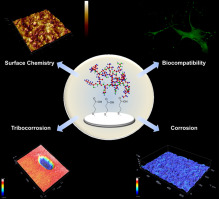Journal of the Mechanical Behavior of Biomedical Materials ( IF 3.9 ) Pub Date : 2018-02-21 , DOI: 10.1016/j.jmbbm.2018.02.024 Luciana D. Trino , Erika S. Bronze-Uhle , Amsaveni Ramachandran , Paulo N. Lisboa-Filho , Mathew T. Mathew , Anne George

|
Titanium (Ti) is widely used in biomedical devices due to its recognized biocompatibility. However, implant failures and subsequent clinical side effects are still recurrent. In this context, improvements can be achieved by designing biomaterials where the bulk and the surface of Ti are independently tailored. The conjugation of biomolecules onto the Ti surface can improve its bioactivity, thus accelerating the osteointegration process.
Ti was modified with TiO2, two different spacers, 3-(4-aminophenyl) propionic acid (APPA) or 3-mercaptopropionic acid (MPA) and dentin matrix protein 1 (DMP1) peptides. X-ray photoelectron spectroscopy analysis revealed the presence of carbon and nitrogen for all samples, indicating a success in the functionalization process. Furthermore, DMP1 peptides showed an improved coverage area for the samples with APPA and MPA spacers. Biological tests indicated that the peptides could modulate cell affinity, proliferation, and differentiation. Enhanced results were observed in the presence of MPA. Moreover, the immobilization of DMP1 peptides through the spacers led to the formation of calcium phosphate minerals with a Ca/P ratio near to that of hydroxyapatite. Corrosion and tribocorrosion results indicated an increased resistance to corrosion and lower mass loss in the functionalized materials, showing that this new type of functional material has attractive properties for biomaterials application.
中文翻译:

使用成骨肽的钛表面生物功能化:表面化学,生物相容性,腐蚀和摩擦腐蚀方面
钛(Ti)由于其公认的生物相容性而广泛用于生物医学设备。然而,植入物失败和随后的临床副作用仍在复发。在这种情况下,可以通过设计生物材料来实现改进,在这些材料中,Ti的体积和表面是独立定制的。将生物分子缀合到Ti表面可以改善其生物活性,从而加速骨整合过程。
Ti用TiO 2改性,两个不同的间隔基,3-(4-氨基苯基)丙酸(APPA)或3-巯基丙酸(MPA)和牙本质基质蛋白1(DMP1)肽。X射线光电子能谱分析表明,所有样品中都存在碳和氮,表明功能化过程成功。此外,对于具有APPA和MPA间隔子的样品,DMP1肽的覆盖面积有所改善。生物学测试表明,这些肽可以调节细胞亲和力,增殖和分化。在MPA存在下观察到增强的结果。此外,DMP1肽通过间隔基的固定化导致形成的Ca / P比值接近羟基磷灰石的磷酸钙矿物质。



























 京公网安备 11010802027423号
京公网安备 11010802027423号